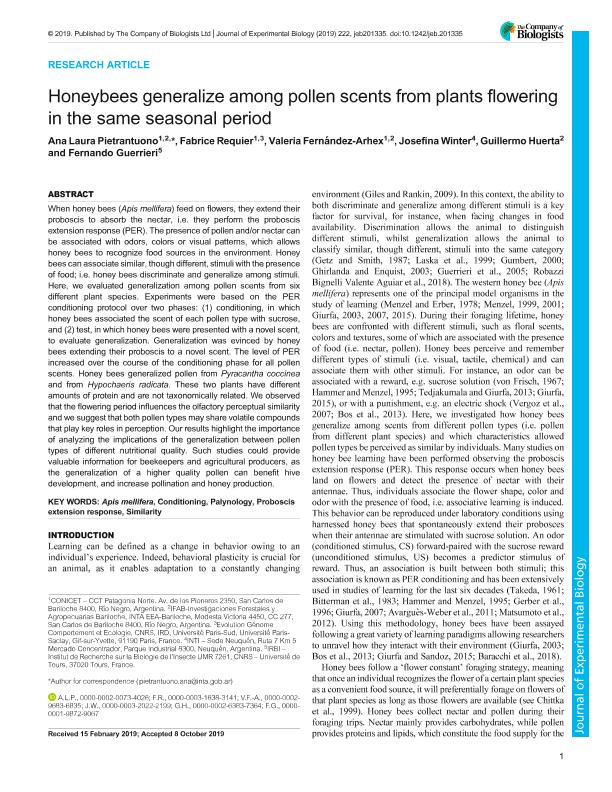Artículo
Honeybees generalize among pollen scents from plants flowering in the same seasonal period
Pietrantuono, Ana Laura ; Requier, Fabrice; Fernandez Arhex, Valeria Cristina
; Requier, Fabrice; Fernandez Arhex, Valeria Cristina ; Winter, Josefina; Huerta, Guillermo; Guerrieri, Fernando Javier
; Winter, Josefina; Huerta, Guillermo; Guerrieri, Fernando Javier
 ; Requier, Fabrice; Fernandez Arhex, Valeria Cristina
; Requier, Fabrice; Fernandez Arhex, Valeria Cristina ; Winter, Josefina; Huerta, Guillermo; Guerrieri, Fernando Javier
; Winter, Josefina; Huerta, Guillermo; Guerrieri, Fernando Javier
Fecha de publicación:
10/2019
Editorial:
Company of Biologists
Revista:
Journal of Experimental Biology
ISSN:
0022-0949
Idioma:
Inglés
Tipo de recurso:
Artículo publicado
Clasificación temática:
Resumen
When honey bees (Apis mellifera)feed on flowers they extend their proboscis to absorb the nectar, i.e. they perform the proboscisextension response (PER). The presence of pollen and/or nectar can beassociated with odors, colors or visual patterns, which allows the bee torecognize food sources in the environment. Bees can associate similar, thoughdifferent, stimuli with the presence of food; i.e. bees discriminate and generalize among stimuli. Here, we evaluated generalization among pollen scents from six different plantspecies. Experiments were based on the PER conditioning protocol over twophases: (1) Conditioning, in whichbees associated the scent of each pollen type with sucrose, and (2) Test, in which bees were presented witha novel scent, to evaluate generalization. Generalization was evinced by beesextending their proboscis to a novel scent. The level of PER increased over thecourse of the conditioning phase for all pollen scents. Bees generalizedpollenfrom Pyracantha coccinea and from Hypochaeris radicata. These two plants havedifferent amountsamount of protein and are not taxonomically related. WeW suggest that both pollen types may share volatile compoundsthat play key roles in perception similarity. Our results highlight theimportance of analyzing the implications of the generalization betweenpollen types of different nutritional quality, since it could provide valuableinformation for beekeeping and agricultural producers (generalization of apollen of lower quality towards one of higher quality can benefit thedevelopment of the hive, increase pollination or honey production). Besides, weobserved that not only chemical features but also temporality are parametersdefining olfactory similarity.
Archivos asociados
Licencia
Identificadores
Colecciones
Articulos (IFAB)
Articulos de INSTITUTO DE INVESTIGACIONES FORESTALES Y AGROPECUARIAS BARILOCHE
Articulos de INSTITUTO DE INVESTIGACIONES FORESTALES Y AGROPECUARIAS BARILOCHE
Citación
Pietrantuono, Ana Laura; Requier, Fabrice; Fernandez Arhex, Valeria Cristina; Winter, Josefina; Huerta, Guillermo; et al.; Honeybees generalize among pollen scents from plants flowering in the same seasonal period; Company of Biologists; Journal of Experimental Biology; 10-2019
Compartir
Altmétricas



